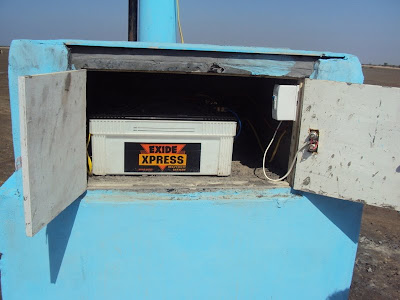The Bhadreshwar Randh Bander has been in the news for the struggle against the OPG power plant. But, now, the fisherfolk are celebrating not just the denial of permission to OPG power plant in Bhadreshwar but also the arrival of light in their homes through micro-windmills in their settlements. The micro-windmills have been installed after due permission from the concerned authorities.
 Ibrahim kaka is incharge of the windmill that services 10 households around his home.
Ibrahim kaka is incharge of the windmill that services 10 households around his home.
 The ABC (Ashapura Bahulakshiseva Charitable Trust) and NABARD, Gujarat have provided four micro-windmills on an experimental basis.
The ABC (Ashapura Bahulakshiseva Charitable Trust) and NABARD, Gujarat have provided four micro-windmills on an experimental basis.
The prominent features of the windmills are as follows:
1. Each windmill unit comprises of the fan, generator, battery and fuse. The fan is made from fibre –glass and does not corrode.
2. The battery gets charged when the fan rotates and when the battery is fully charged the fan is halted and resumes when the battery charge is below maximum level.

3. Each windmill unit can provide lighting for about 10 households. The lamps are of LED type and fisherfolk say that the brightness is very good. In fact they prefer lamps of lesser brightness.
 4. The windmill also has a provision for charging mobile phones. However, it is difficult to use right now because one will have to stand near the windmill till the mobile phone gets charged. Instead it is suggested to provide charging points in the homes.
4. The windmill also has a provision for charging mobile phones. However, it is difficult to use right now because one will have to stand near the windmill till the mobile phone gets charged. Instead it is suggested to provide charging points in the homes.
5. Each household contributes a monthly fee of Rs.100, which is maintained by the head of the group (of 10 households) and this amount is to be used for maintenance of the windmills.
6. Each windmill unit supposedly costs about Rs.1,20,000 and the expense for the four experimental machines was borne by NABARD and ABC Trust.
7. This facility is especially useful for women as they need light for 3-4 hours in the night to immediately sort the fish catch that arrives in the night .
 Fisherfolk say that the technology is a big improvement over the kerosene lamps for which they spend about Rs.600 per month for buying Kerosene, which is also difficult to obtain many times as the monthly kerosene requirement of a fishing household is more than what is provided through ration shops.
Fisherfolk say that the technology is a big improvement over the kerosene lamps for which they spend about Rs.600 per month for buying Kerosene, which is also difficult to obtain many times as the monthly kerosene requirement of a fishing household is more than what is provided through ration shops.

The fisherfolk are excited by the new arrival though they can say for sure that the windmills are a success only after few months.
Fisherfolk demand that the Government should provide more micro-windmills to cover every family on the fishing settlement. This will definitely prove to be a big step towards the development of the community.
The fishing settlement is also using Solar power. The solar panels are marketed by Sahjeevan, a local NGO working on alternative energy solutions. Each solar power unit costs about Rs.5,000 and can provide enough power for a lamp and for charging mobile phones.
 MASS welcomes and supports these energy solutions which are environment friendly and insists upon the Government to promote these renewable energy solutions for the welfare of the coastal communities.
MASS welcomes and supports these energy solutions which are environment friendly and insists upon the Government to promote these renewable energy solutions for the welfare of the coastal communities.
The prominent features of the windmills are as follows:
1. Each windmill unit comprises of the fan, generator, battery and fuse. The fan is made from fibre –glass and does not corrode.
2. The battery gets charged when the fan rotates and when the battery is fully charged the fan is halted and resumes when the battery charge is below maximum level.
3. Each windmill unit can provide lighting for about 10 households. The lamps are of LED type and fisherfolk say that the brightness is very good. In fact they prefer lamps of lesser brightness.
5. Each household contributes a monthly fee of Rs.100, which is maintained by the head of the group (of 10 households) and this amount is to be used for maintenance of the windmills.
6. Each windmill unit supposedly costs about Rs.1,20,000 and the expense for the four experimental machines was borne by NABARD and ABC Trust.
7. This facility is especially useful for women as they need light for 3-4 hours in the night to immediately sort the fish catch that arrives in the night .
The fisherfolk are excited by the new arrival though they can say for sure that the windmills are a success only after few months.
The fishing settlement is also using Solar power. The solar panels are marketed by Sahjeevan, a local NGO working on alternative energy solutions. Each solar power unit costs about Rs.5,000 and can provide enough power for a lamp and for charging mobile phones.